- News
- Reviews
- Bikes
- Components
- Bar tape & grips
- Bottom brackets
- Brake & gear cables
- Brake & STI levers
- Brake pads & spares
- Brakes
- Cassettes & freewheels
- Chains
- Chainsets & chainrings
- Derailleurs - front
- Derailleurs - rear
- Forks
- Gear levers & shifters
- Groupsets
- Handlebars & extensions
- Headsets
- Hubs
- Inner tubes
- Pedals
- Quick releases & skewers
- Saddles
- Seatposts
- Stems
- Wheels
- Tyres
- Tubeless valves
- Accessories
- Accessories - misc
- Computer mounts
- Bags
- Bar ends
- Bike bags & cases
- Bottle cages
- Bottles
- Cameras
- Car racks
- Child seats
- Computers
- Glasses
- GPS units
- Helmets
- Lights - front
- Lights - rear
- Lights - sets
- Locks
- Mirrors
- Mudguards
- Racks
- Pumps & CO2 inflators
- Puncture kits
- Reflectives
- Smart watches
- Stands and racks
- Trailers
- Clothing
- Health, fitness and nutrition
- Tools and workshop
- Miscellaneous
- Buyers Guides
- Features
- Forum
- Recommends
- Podcast
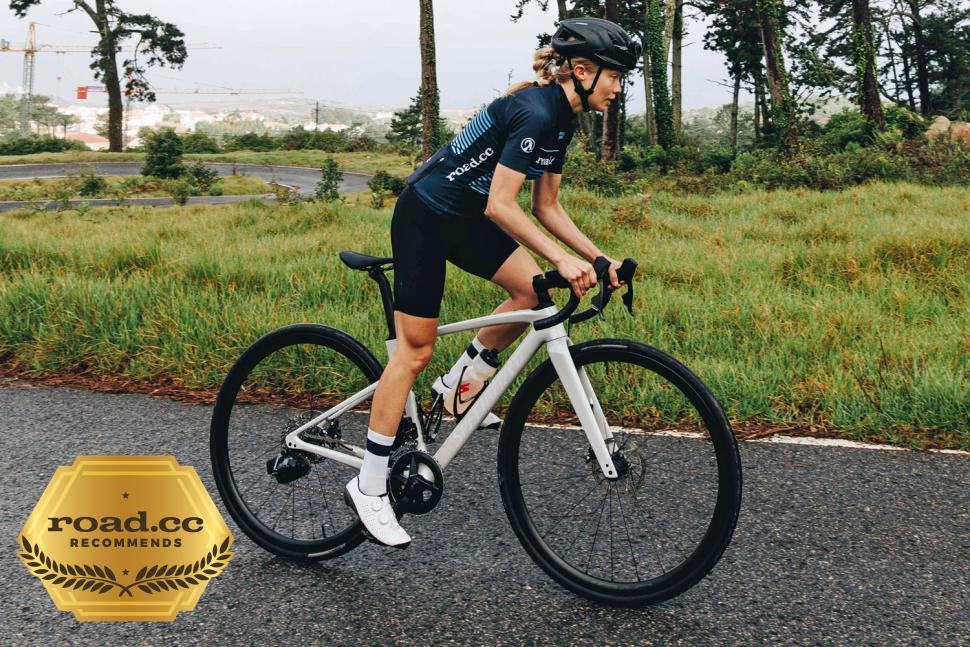 Specialized Roubaix SL8 Expert
Specialized Roubaix SL8 Expert£5,500.00
VERDICT:
Sublimely smooth bike that is capable, versatile and comfortable without compromising performance
True all-road bike with 40mm tyre clearance and mudguard mounts
Smooth ride quality
Threaded BB
No internal headset cable routing
Compatible with mechanical and electronic drivetrains
Adjustable Future Shock only on top models
Weight:
8,500g
Contact:

This product has been selected to feature in road.cc recommends. That means it's not just scored well, but we think it stands out as special. Go to road.cc recommends
At road.cc every product is thoroughly tested for as long as it takes to get a proper insight into how well it works. Our reviewers are experienced cyclists that we trust to be objective. While we strive to ensure that opinions expressed are backed up by facts, reviews are by their nature an informed opinion, not a definitive verdict. We don't intentionally try to break anything (except locks) but we do try to look for weak points in any design. The overall score is not just an average of the other scores: it reflects both a product's function and value – with value determined by how a product compares with items of similar spec, quality, and price.
What the road.cc scores meanGood scores are more common than bad, because fortunately good products are more common than bad.
- Exceptional
- Excellent
- Very Good
- Good
- Quite good
- Average
- Not so good
- Poor
- Bad
- Appalling
Specialized's Roubaix has earned its place as a go-to bike for those who value a smooth ride over an aggressive, speed-chasing riding position. The latest Roubaix SL8 model continues this legacy, but rather than a complete overhaul, it's been updated with some thoughtful tweaks. Specced with its newest third-generation Future Shock 3.0 front suspension system, mudguard compatibility and 40mm tyre clearance, the Specialized Roubaix SL8 Expert has proved an ideal companion for long rides and even for taking on some rough roads comfortably.
If you're interested in the Roubaix SL8, you might want to check out others in our guide to the best endurance road bikes.
> Buy now: Specialized Roubaix SL8 Expert for £5,250 from Tredz
While it may not be the lightest or the most aggressive endurance road bike on the market, the Roubaix SL8's smooth ride sets it apart. And though it comes with a hefty – if not quite as hefty as it was when I started my review – price tag, if smooth handling and comfort are what you're after, it's hard to beat, especially on the bumpy roads of the UK.
As a lover of long-distance rides, I've always liked the idea of the Roubaix and its promise of smooth-riding comfort. I first got to take it out for a quick spin at a press camp in Portugal, but although we did manage to find some slippery cobbles there, the roads were mostly buttery smooth. On home turf in Scotland, things are different, and I've certainly got to test its smoothing capabilities plenty in the last couple of months.
Specialized Roubaix SL8 Expert: Ride
From short after-work spins to all-day rides, including one 200km outing, the Roubaix has been as smooth as it promised. Even when the surfaces were sub-optimal, and even when fatigue started to kick in, the bike kept me free of aches and pains.
Despite the new Future Shock suspension – the main unique selling point of this bike – softening the front end considerably, it doesn't equate to a bike that handles weirdly. The 20mm headset suspension isn't the only thing contributing to the Roubaix SL8's smoother ride feel, either. With room for wider tyres – the S-Works Mondos fitted on my bike measured 34mm – the rubber effectively smooths out the initial bumps and gravel rattle, while the Future Shock absorbs the main vibrations before they get to the arms and neck.
I'll get on to the nitty gritty of the Future Shock in a minute, but as with any suspension, its function is connected to the rider's weight. This means that to get the best out of it, it needs to be customisable. I am very much at the lower end of the weight range (50-120kg) that Specialized lists for the different springs you can fit in, and I'd say that because of that I never felt the damping to be overly soft, even with the softest spring fitted in (you get three of them with the bike). Instead of feeling like a suspension fork-equipped bike, the Roubaix still feels like a road bike, but it just makes riding over road imperfections, speed bumps and the like a less bone-rattling experience. I could tell the shock was working, especially when climbing out of the saddle and weighing down the front more, but the system works up and down with you in a way that doesn't distract.
The Future Shock and wider tyres do add weight to the bike, though, and at 8.5kg with cages and pedals included this is not a lightweight climbing machine. That said, I could only really feel the weight on the steepest of climbs and when wanting to accelerate fast – it never felt like the extra grams were holding me back.
The rear end of the bike feels supportive but noticeably stiffer – possibly emphasised by the front-end suspension, and the fact that I'm a smaller rider. The Pavé seatpost and a lower insertion point add some flex, which you can see when pressing the saddle down and back, but it's a lot less than I've experienced with, for example, the Liv D Fuse seatpost. I don't see that as a negative: if you want efficiency then you can't make the whole bike overly damped, and the Roubaix feels very efficient munching the miles.
The bottom bracket area is also stiff and power transfer is great, even if the Roubaix is less reactive than a racier, rigid bike would be. With its slim fork and tube shapes, it's still aero enough to be pushed hard on the flats, and when the road tilts down I've found the slightly longer and relaxed geometry, paired with the suspension, keeps things very planted. The bike feels calm and composed rather than twitchy and overly reactive, which for an endurance bike is an advantage.
While sprinting isn't this bike's forte, it's helped me claim many personal records on descents because of its confident feel; the more at ease you feel on the bike, the faster you are going to go on it. That's certainly been the case with the Roubaix for me – it's helped me maintain speed a lot more efficiently than on my Specialized Tarmac, which in the small frame sizes gets a lot more nervous on high-speed descents.
If you're a weight-weenie or you prefer a super traditional ride feel, you might want to think twice, but if you're an endurance rider who values comfort without sacrificing too much speed, the Roubaix SL8 could be your new best friend.
Specialized Roubaix SL8 Expert: Frame details
So, the bike is nice to ride, but what about the tech details? The Roubaix has been in the American brand's lineup for a good while now, and with the newest iteration Specialized hasn't exactly gone wild and changed the essence of the bike – which was already well received as it was. The main differences on the newest model are the 40mm tyre clearance, some slight frame tweaks, and the updated suspension. The geometry is much the same, and despite the other changes, the promised – and delivered – ride quality is also akin to what you'd expected from the previous generation Roubaix.
The frame updates are pretty subtle and include lower seatstays, refined tube shapes for some marginal aero gains, and the generous seatpost flex. And when I say generous, Specialized is claiming a good 18mm of movement with this AfterShock system, which consists of the D-shaped Pavé seatpost with a dropped clamp design – the seat clamp sits 65mm deep inside the seat tube instead of a more traditional clamp that would sit at the top.
This leaves more seatpost free to flex but also means the Roubaix needs a longer-than-normal seatpost to allow the lower clamp to work effectively; it also accounts for the bulbous look of the seat clamp area. Whether you get exactly that 18mm of movement is hard to measure, but I could tell there was flex there.
Tyre clearance now extends to 40mm for light gravel use, which really does add to the bike's versatility, and the inclusion of mudguard mounts is a welcome addition for any of us in damper climes.
Specialized has also added two new mounting points: one on the top tube and the other on the underside of the down tube. You can add a bolt-on top tube bag without it interfering with the Future Shock, and the down tube mounts can take a third bottle or a tool caddy for longer rides – again, neat little additions with long distances in mind.
The result of all these changes, and a more advanced layup of the Fact 10r carbon blend, is a frame that Specialized says is 50g lighter than previously. It's by no means a bike for weight-weenies – weights start from 9.46kg for the base model, while the top-of-the-range S-Works Roubaix comes in at a claimed 7.3kg in size 56 – but my size 49 bike tipped the scales at 8.5kg including bottle cages and pedals, which is by no means heavy for an endurance road bike.
There are a few things that haven't changed: the frame still takes both electronic and mechanical groupsets, and the cable routing at the front remains external, which aesthetically might not please some, but I fully embrace the simplicity of service and setup changes that enables.
Specialized Roubaix SL8 Expert: Future Shock
Frame changes aside, the Roubaix's most notable feature continues to be the Future Shock up front, which is now in its third generation. The newest Roubaix bikes get one of the three versions of the system: the 3.1 with a simple coil spring and no damping (Roubaix Sport 105, Sport Apex and Base models); the 3.2 with hydraulic damping (Roubaix Expert and Comp), and the top-of-the-line 3.3 with adjustable compression. When set optimally, the suspension – which Specialized first introduced in 2016 – offers 20mm of travel, but there is now more adjustability through the spring rates and spacers than before.
The Future Shock system is placed between the head tube and the stem, so instead of this working to smooth out the bike, it's designed to suspend the rider. If the bike can move underneath you, Specialized claims, that should lead to less fatigue, especially on longer rides, and my experiences bear that out.
Though the proprietary nature of the Future Shock can be a buying deterrent for some, taking it apart doesn't require special tools, and after you've done it once you're not likely to think it was all that complicated (or you can take it to a shop for a service, as it is all serviceable). It also has added seals and the boot is thicker, which should extend service intervals.
Even if you leave the headset as it is, there is one thing that might require you to open the headset to get the most out of the bike: changing the booster spring, which comes in three different preloads. The three options – firm, medium and soft – are, according to Spesh, different in terms of their spring load from those used on the Future Shock 2.0. All of the Roubaix SL8 models come with the medium-strength (black) spring fitted in, but you get the other two with the bike in case you want to swap. You also get five preload washers which can be used to further tweak the spring tension. As I mentioned earlier, I rode with the softest spring and no spacers (which would add a little bit more stiffness).
If all that isn't enough adjustability, the 3.3 model with its five-step compression adjuster (and ability to switch off the damping) is the best at tailoring the damping, but you only get that on the S-Works and Pro models as stock. You can upgrade later if you want, and similarly, if you have an older generation Roubaix you can put one of the 3.0 Future Shocks in (only from size 49 upwards because of its longer length, though).
Specialized Roubaix SL8 Expert: Geometry
With these minor frame changes, it comes as no surprise that the new geometry of the Roubaix SL8 is not too significant a departure from the outgoing model in terms of reach and stack. But some numbers have changed, mostly to create clearance for those bigger tyres.
There's a slightly slacker head tube angle, more fork offset and an extended front centre which means the (now bigger) front tyre stays away from the toes. The chainstays are also longer, and the bottom bracket is pretty low at 80mm. All of this correlates with the very reassured ride feel.
For the rest of the numbers, my size 49 frame has a 992mm wheelbase, 549mm stack and 363mm reach. The seat tube angle sits at 74 degrees and the head tube angle at 70.8 degrees.
The smallest frame size, 44, does see a jump in the seat and head angles – both by a degree, to a steeper setup – but overall, for a small frame these numbers are good, and certainly slacker and more orientated to neutral or calm steering.
If you're someone who rides low and slammed, then the Roubaix probably isn't the best option. It does come with two headset covers to adjust the stack, but there is only so much tinkering you can do to the front height with the Future Shock installed. Specialized hasn't helped the stack height on stock builds by kitting the Roubaix with the hover bar, but you could still make some changes to lower the front end: opt for a simple flat-top road handlebar instead of the hover that adds 15mm of rise to your setup, and fit the lower headset cover.
If you fitted the lower headset cover and a normal non-riser bar, you'd already be 20mm lower, and I'd perhaps go for a slightly longer stem than the 80mm the size 49 frame comes with, too. I was fine on the bike as it came out of the box, but I'm thinking it wouldn't hurt to be slightly lower while my flexibility still allows it.
Apart from that taller front end, the Roubaix's geometry isn't miles away from bikes such as Liv's Avail (and Giant's Defy) and Trek's Domane, both also aimed at the endurance road market. Those bikes are a smidge longer but, at the same time, considerably lower. It's also akin to the newest Canyon Endurace's geometry. It really depends what you're after in deciding which is best for you, but generally, the Roubaix will give you a more upright position.
Specialized Roubaix SL8 Expert: Build
Specialized is offering the new Roubaix SL8 in seven complete builds and as a bare frameset, with prices for complete bikes ranging from £2,500 for the base Roubaix SL8 up to £12,000 for the S-Works model, which Dave already reckoned was "alarmingly expensive" when he reviewed the previous model, retailing for £9.5k, in 2020.
While the flagship model features a SRAM Red AXS wireless groupset and Roval Terra CLX wheels, the Expert test model comes with a SRAM Rival AXS 12-speed groupset and Roval Terra C wheels.
There is a power meter, too, but it's a single-sided affair. If you want to know more about Rival AXS, we've done a full review, and I agree with what Mat says about it.
The wheels are wrapped in 32mm-wide S-Works Mondo 2BR tyres, which actually measured up at nearly 34mm.
The alloy Hover bar is comfortable and grippy, but I'm not quite sure why it's supplied with this bike as it simply raises you even higher at the front. I like the shape, and the drops are comfy, but I would have preferred a standard non-riser bar. I doubt I'm alone in thinking this way. Also, only the Pro and S-Works models get a carbon bar.
The saddle and seatpost are also from Specialized, and the handlebar is wrapped in Supacaz Super Sticky Kush tape, which is on the thinner side but very grippy.
Specialized Roubaix SL8 Expert: Value
A year after its official launch, the Expert model is £5.5k, and can be found for less at many online retailers, but when I started to write this review the full RRP stood at £6k. If Specialized hadn't dropped some of its prices with the 2025 stock rolling in, I'd have said this wasn't the best value bike out there.
You can still get a better groupset on other bikes for the same money, but the new lower RRP isn't totally unjustifiable. The Roval Terra C wheels are pretty reliably built (if not the lightest) and even gravel ready, and the saddle and seatpost are great.
It is up against some serious competition, though. The Liv Avail and Giant Defy have both been updated recently and scored very highly in our reviews. The Liv Avail Advanced Pro 0 that Emma reviewed is £5,999, so slightly more than the Roubaix Expert, but it also gets a Shimano Ultegra Di2 groupset, a dual-sided power meter, carbon finishing kit and a lighter wheelset. The same goes for the Giant Defy.
The newest Canyon Endurace CF SLX continues to lack mudguard mounts and has less tyre clearance than the Roubaix, but it does have pretty neat top tube storage. You also get DT Swiss ERC 1400 Dicut wheels and SRAM Force AXS for less than the Roubaix (£5,149), or even less if you opt for Shimano Ultegra Di2 R8100 (£4,849), and you get a power meter.
We haven't reviewed a Trek Domane on road.cc since Mat put the SL Disc through its paces in 2021, but on paper the current Domane SL 7 Gen 4 promises much the same on the versatility and comfort front as the Roubaix SL8 Expert, but costs £6,100 – though you do get an Ultegra Di2 groupset. It's also the only one of these rivals with suspension, in the form of its rear-damping IsoSpeed.
Specialized Roubaix SL8 Expert: Conclusion
The Roubaix SL8 delivers the 'smoother is faster' ethos it's built upon. It's an excellent option, especially if you struggle with fatigue-related issues on longer rides, and it can double up as a light gravel bike.
With its lower retail pricing, it's not bad value, though ideally I'd like to see it equipped with a SRAM Force AXS groupset, and with the Future Shock 3.3; the suspension works well without the adjuster dial, but having the option to fine-tune the ride would have added value.
Overall, though, it's a bike that few other endurance all-road bikes can trump in terms of its sublime and smooth ride quality and the versatility that 40mm tyre clearance allows. For me, it's an ideal mile-munching companion and I'll be sad to part ways with it. If you can throw in another two grand and get the full carbon finishing kit and adjustable Future Shock 3.3, you'd likely never have to think about buying another bike again.
> Buy now: Specialized Roubaix SL8 Expert for £5,250 from Tredz
Verdict
Sublimely smooth bike that is capable, versatile and comfortable without compromising performance
road.cc test report
Make and model: Specialized Roubaix SL 8 Expert
Size tested: 49
About the bike
List the components used to build up the bike.
Frame
FACT 10R, Rider First Engineered™ (RFE), FreeFoil Shape Library tubes, threaded BB, 12x142mm thru-axle, flat-mount disc
Suspension
Fork
Future Shock 3.2 w/ Smooth Boot, FACT Carbon 12x100mm, thru-axle, flat-mount disc
Cockpit
Handlebars
Specialized Hover Expert, Alloy, 125mm Drop, 75mm Reach w/Di2 Hole
Saddle
Body Geometry Power Expert
Stem
Future Stem Pro
Tape
Supacaz Super Sticky Kush
SeatPost
S-Works Pave Seat post
Seat Binder
Hidden drop clamp
Brakes
Rear Brake
SRAM Rival eTAP AXS, hydraulic disc
Front Brake
SRAM Rival Hydraulic Disc
Drivetrain
Shift Levers
SRAM Rival eTAP AXS, 12-speed
Front Derailleur
SRAM Rival eTAP AXS, 12-speed
Rear Derailleur
SRAM Rival eTAP AXS, 12-speed
Cassette
SRAM XG 1250, 10-36T
Crankset
SRAM Rival AXS w/Power, 12-speed
Chainrings
46/33T
Bottom Bracket
SRAM DUB BSA
Chain
SRAM Rival, 12-Speed
Wheels & Tires
Front Wheel
Roval Terra C, 25mm inner width carbon rim, 32mm depth, NEW DT 370 hub, 24h, DT Swiss Comp Race spokes
Rear Wheel
Roval Terra C, 25mm inner width carbon rim, 32mm depth, NEW DT 370 Star Ratchet hub, 24h, DT Swiss Comp Race spokes
Front Tire
S-Works Mondo 2BR, 700x32c
Rear Tire
S-Works Mondo 2BR, 700x32c
Inner Tubes
700x28/38mm, 48mm Presta valve
Tell us what the bike is for and who it's aimed at. What do the manufacturers say about it? How does that compare to your own feelings about the bike?
Specialized says: "We created the endurance road category two decades ago proving that high ergonomics means high performance. Today, the new Roubaix SL8 with Future Shock 3.0 is lighter, faster, and smoother than any road bike ever made, unleashing unmatched confidence. The road may be hell below, but on Roubaix, it's always heaven above."
It is a thoroughbred endurance road bike with added suspension.
Where does this model sit in the range? Tell us briefly about the cheaper options and the more expensive options
The £5,500 Roubaix SL8 Expert is specced with a SRAM Rival AXS groupset with a power meter chainset. This is the model below the Expert Pro that comes with SRAM Force eTAP AXS (£8,000) and the top-of-the-range S-Works (£12,000) with SRAM Red AXS. The models below come with a range of electronic wireless and mechanical groupsets, and prices start from £2,500 for the base model equipped with 10-speed Shimano Tiagra 4720. All of the models are built with a FACT 10R carbon frame, apart from the S-Works that gets FACT 12R, and is also available as a frameset only for £4,750.
Frame and fork
Overall rating for frame and fork
10/10
Tell us about the materials used in the frame and fork?
Carbon, FACT 10R.
Tell us about the geometry of the frame and fork?
Overall, the geometry of the Roubaix SL8 isn't a massive departure from the outgoing model in terms of reach and stack, but the frame has some numbers changed, mostly to create clearance for those bigger tyres. The slightly slacker head tube angle, more fork offset and extended front centre mean the front tyre is further away from the toes. The chainstays are also longer, and the bottom bracket lower at 80mm. My size 49 frame came with a 992mm wheelbase, 549mm stack and 363mm reach. The seat tube angle sits at 74° and the head tube angle at 70.8°. Overall, for a small frame these numbers are good and certainly slacker and more neutral/calm steering than the Tarmac, for example. I'd say that the smallest size, 44, gets a little compromised and the jump in seat and head angles are one degree to a steeper setup.
How was the bike in terms of height and reach? How did it compare to other bikes of the same stated size?
Overall, the Roubaix's stack height is noticeably higher because of the Future Shock, and it's not helped by being paired with the Hover bar. And because of the Future Shock there isn't quite as much leeway to play with your fit on this bike as on others. You can make some changes to lower the front end, though: opt for a simple flat-top road handlebar instead of the Hover that adds 15mm of rise to your setup, and fit the lower headset cover.
The overall setup is akin to the newest Canyon Endurace's geometry.
Bikes such as the Liv Avail (and Giant Defy) and Trek Domane, also aimed at the endurance road market, are slightly longer but also lower.
Riding the bike
Was the bike comfortable to ride? Tell us how you felt about the ride quality.
On the road, the Roubaix SL8 delivers smoothness from the bottom up. The wider tyres – the Mondos actually measured 34mm on the wheels – smooth out the initial bumps and gravel rattle, while the Future Shock absorbs the main vibrations before they get to the arms and neck. After the first couple of rides I barely paid attention to the system at all. The bike also made me much more confident on descents.
Did the bike feel stiff in the right places? Did any part of the bike feel too stiff or too flexible?
Balanced.
How did the bike transfer power? Did it feel efficient?
Even with the added comfort at the front of the bike, the Roubaix remains very efficient. The bottom bracket area is stiff and power transfer is great – even if it is less reactive than a racier bike would be. That's not to its detriment but rather an advantage – it's calm and composed rather than twitchy and overly reactive.
Was there any toe-clip overlap with the front wheel? If so was it a problem?
Not an issue.
How would you describe the steering? Was it lively neutral or unresponsive? Neutral.
Tell us some more about the handling. How did the bike feel overall? Did it do particular things well or badly?
Very confidence inspiring, especially at high speeds.
Which components had the most effect (good or bad) on the bike's comfort? would you recommend any changes?
The Future Shock and relaxed geometry with no steep angles.
Rate the bike for efficiency of power transfer:
9/10
Rate the bike for acceleration:
9/10
Rate the bike for sprinting:
6/10
Rate the bike for high speed stability:
10/10
Rate the bike for cruising speed stability:
10/10
Rate the bike for low speed stability:
9/10
Rate the bike for flat cornering:
9/10
Rate the bike for cornering on descents:
10/10
Rate the bike for climbing:
8/10
The drivetrain
Rate the drivetrain for performance:
8/10
At times the front derailleur didn't keep the chain in place that well when shifting quickly.
Rate the drivetrain for durability:
9/10
Rate the drivetrain for weight:
6/10
Rate the drivetrain for value:
5/10
I think for a £5.5k bike I'd want a dual-sided power meter and a SRAM Force AXS-level groupset.
Tell us some more about the drivetrain. Anything you particularly did or didn't like? Any components which didn't work well together?
It's a good groupset, but you might expect Force at this price point.
Wheels and tyres
Rate the wheels for performance:
8/10
Rate the wheels for durability:
9/10
Rate the wheels for weight:
7/10
Rate the wheels for comfort:
9/10
No complaints on comfort, especially when paired with the wider tyres.
Rate the wheels for value:
8/10
The wheels are robust and can take wider gravel tyres too.
Tell us some more about the wheels.Did they work well in the conditions you encountered? Would you change the wheels? If so what for?
The Roval Terra C wheels are a good match in terms of width and purpose, but you get DT Swiss 370 hubs and a not-overly-light 1,610g weight. They do what they're meant to, and are likely to serve you for a long while reliably, but they don't exactly elevate the bike as they're more of an all-rounder/all-road wheelset.
Rate the tyres for performance:
8/10
Rate the tyres for durability:
9/10
Rate the tyres for weight:
7/10
Rate the tyres for comfort:
9/10
Rate the tyres for value:
8/10
Tell us some more about the tyres. Did they work well in the conditions you encountered? Would you change the tyres? If so what for?
The Mondo tyres are excellent all-rounders, especially for long miles. They do measure wide, though, with the 32mm coming out at nearly 34mm on the Roval wheels.
Controls
Rate the controls for performance:
8/10
At times the front derailleur didn't keep the chain in place that well when shifting quickly.
Rate the controls for durability:
9/10
Rate the controls for weight:
7/10
Rate the controls for comfort:
7/10
Rate the controls for value:
7/10
Tell us some more about the controls. Any particularly good or bad components? How would the controls work for larger or smaller riders?
The SRAM controls aren't quite as good for small hands as main rivals', but they do work and there's enough reach adjustment so you can tailor the fit.
Your summary
Did you enjoy riding the bike? Yes
Would you consider buying the bike? Yes
Would you recommend the bike to a friend? Yes
How does the price compare to that of similar bikes in the market, including ones recently tested on road.cc?
At its new lower RRP, I'd say it's on a par with its main contenders, the Liv Avail/Giant Defy, Trek Domane, and Canyon Endurace. It's £499 less than the Liv Avail Advanced SL 0, but that has a Shimano Ultegra Di2 groupset, dual-sided power meter, and a lighter wheelset, and while it's £600 less than the Trek Domane SL 7 Gen 4, that also has an Ultegra Di2 groupset (and is the only one of these rivals with suspension, its rear-damping IsoSpeed). The Canyon Endurace CF SLX is around £350 less, with DT Swiss ERC 1400 Dicut wheels and SRAM Force AXS, though it lacks mudguard mounts and offers less tyre clearance.
Rate the bike overall for performance:
9/10
Rate the bike overall for value:
5/10
Use this box to explain your overall score
Though I think the price of the Expert model is still a little on the high side, this is a stellar bike to ride for anyone who wants to do long miles, perhaps some lighter gravel and both adventure and fast rides – all on one bike. It's excellent.
About the tester
Age: 30
I usually ride: Specialized Tarmac Sl6 My best bike is:
I've been riding for: 5-10 years I ride: Every day I would class myself as: Expert
I regularly do the following types of riding: cyclo cross, commuting, touring, general fitness riding, mtb, Ultra-distances
Latest Comments
- chrisonabike 9 min 57 sec ago
Indeed - but again these are perhaps questions we should keep asking. Even if the immediate answer is "well we are where we are" or "how on earth...
- Rendel Harris 31 min 51 sec ago
From the text you quoted: We were coming towards the bor-...
- hawkinspeter 39 min 52 sec ago
Quite - alcoholics are suffering from a disease. However choosing to drive whilst drunk is a purely selfish thing to do and anyone who does that...
- Surreyrider 1 hour 2 min ago
Specialized aren't that American. Merida owns something like 49%.
- wtjs 1 hour 6 min ago
I did consider setting up an Access or Open Office database and/or spreadsheet, but the search facility in File Explorer linked to a text file...
- wtjs 1 hour 57 min ago
Then smash bad driving behaviour very hard...
- Steve K 3 hours 6 min ago
The original estimate on the Merckx jersey seemed very low to me (I would have been tempted at just over £800).
- Rendel Harris 5 hours 11 min ago
I have a Nightrider and it's all reflective from the hips down at the back. Yes the Phantom is black from below the shoulder blades but the arms...
- David9694 6 hours 34 min ago
Calls for Oxfordshire transport chief to resign blocked...
- Bungle_52 8 hours 58 min ago
That one was completely different though, it was a driver not a car as in the other 3. So 1 in 4 of the stories manage to follow reporting guidelines.
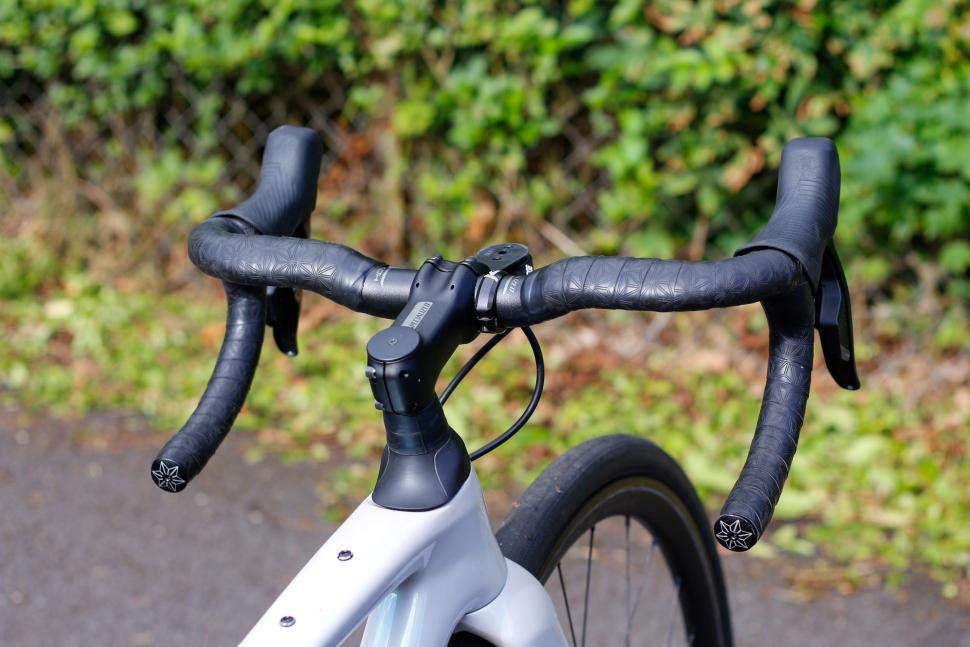
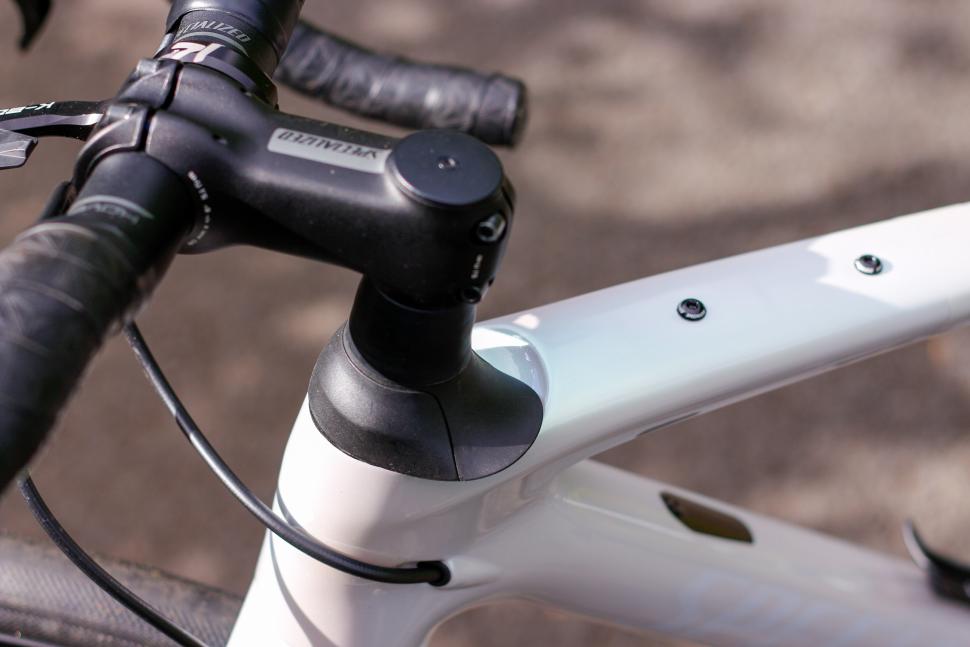
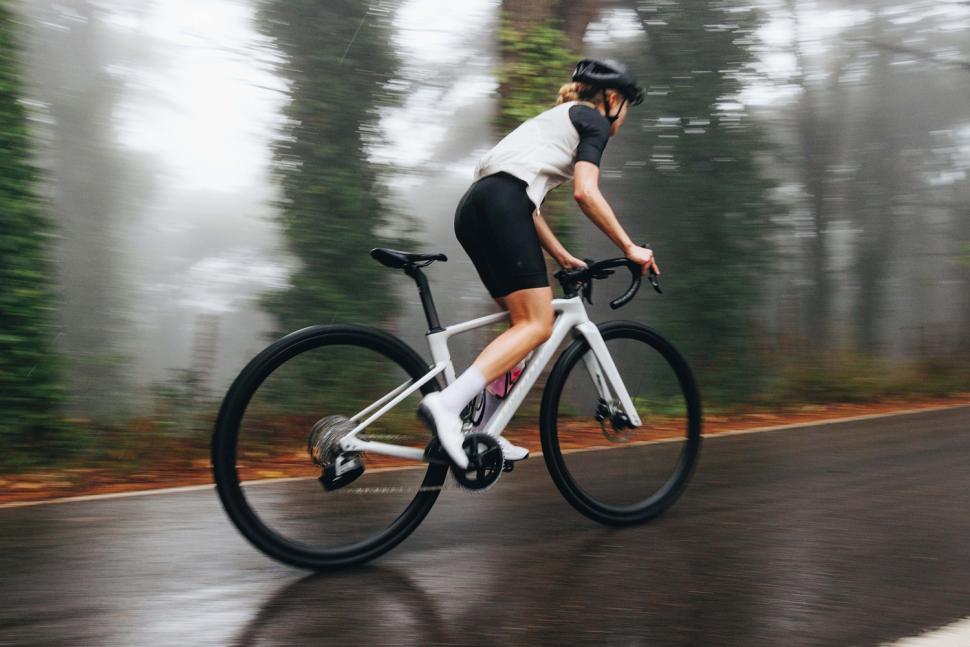
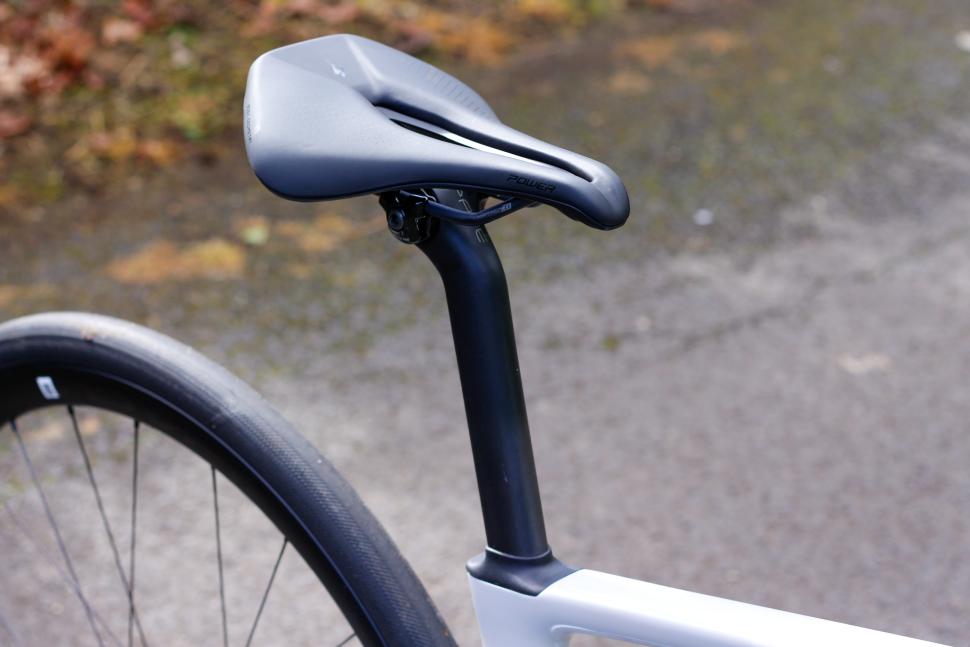
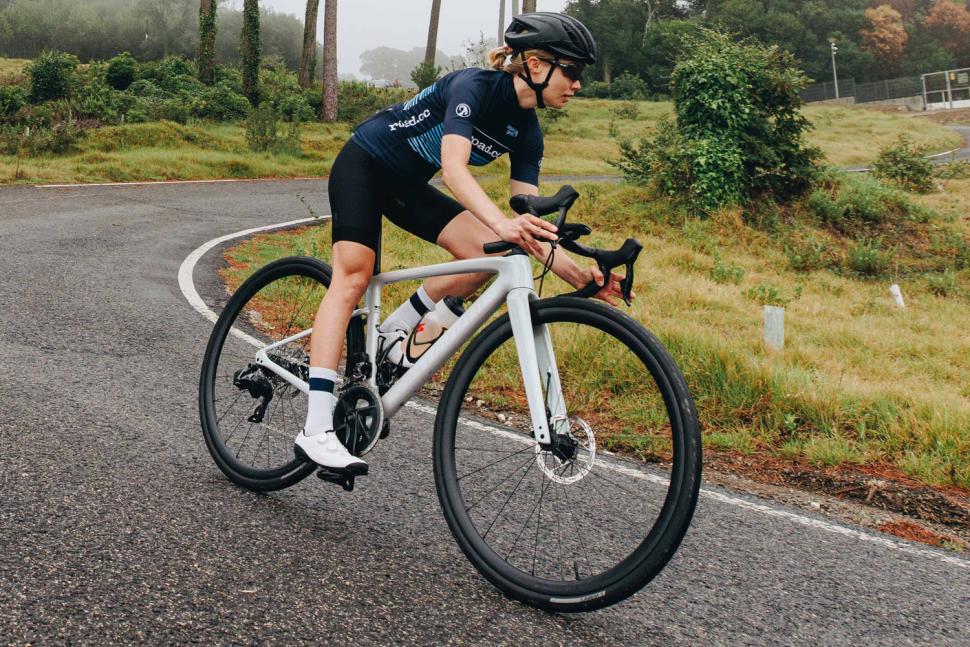
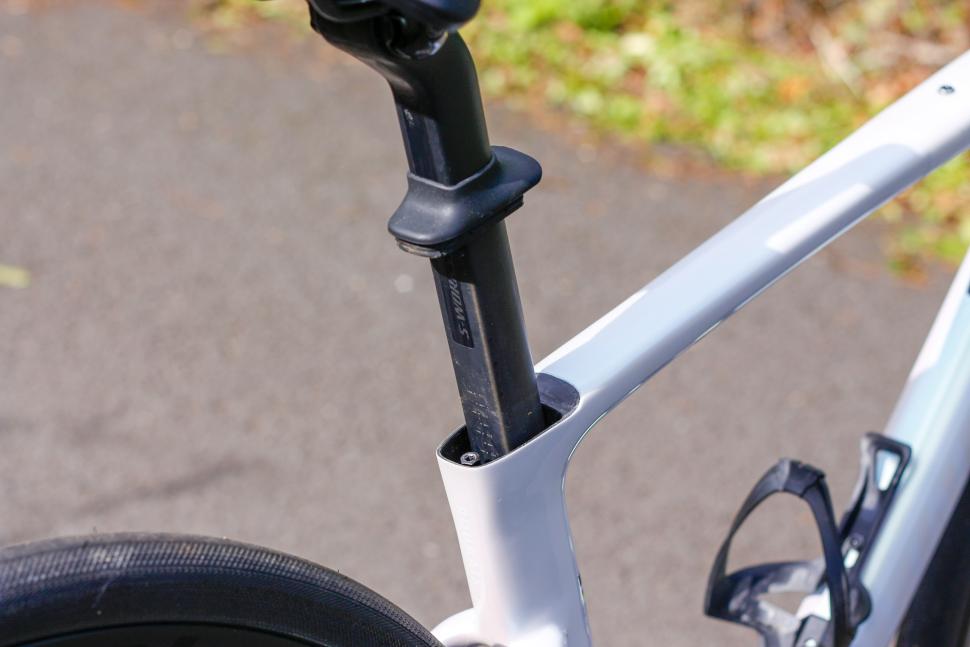
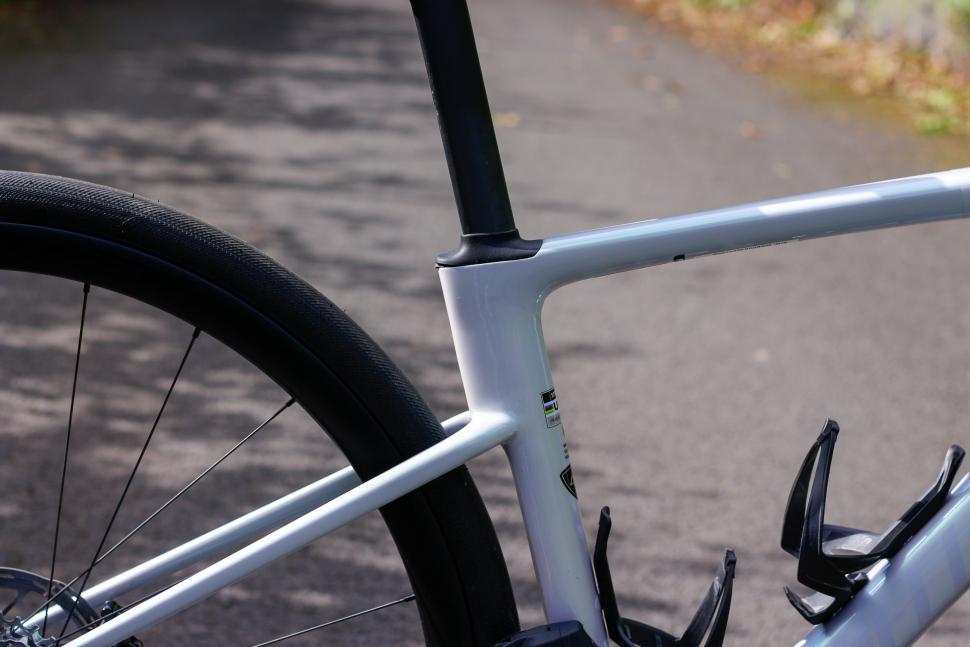
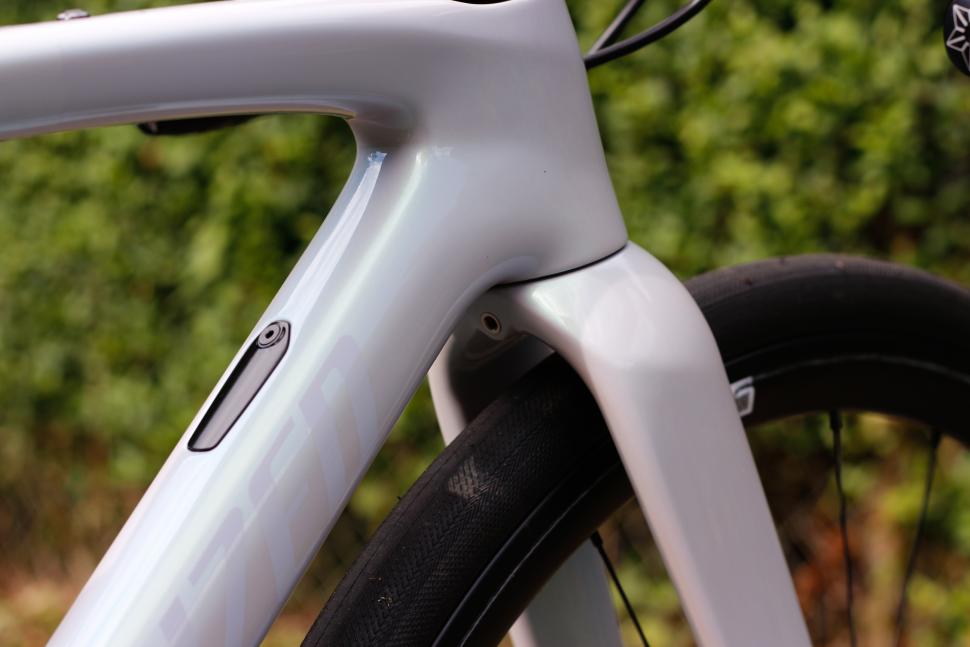
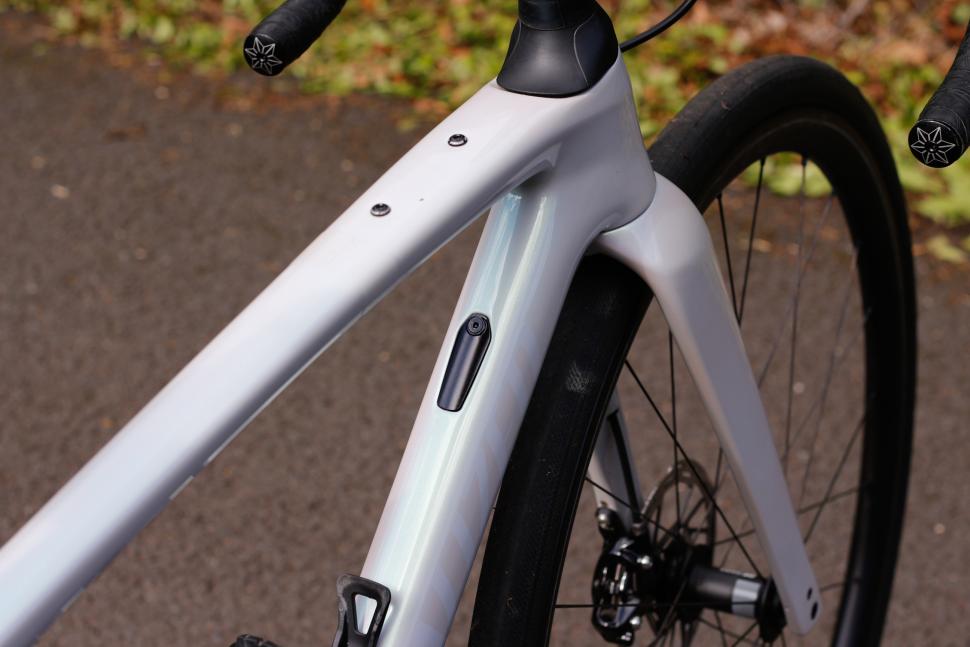
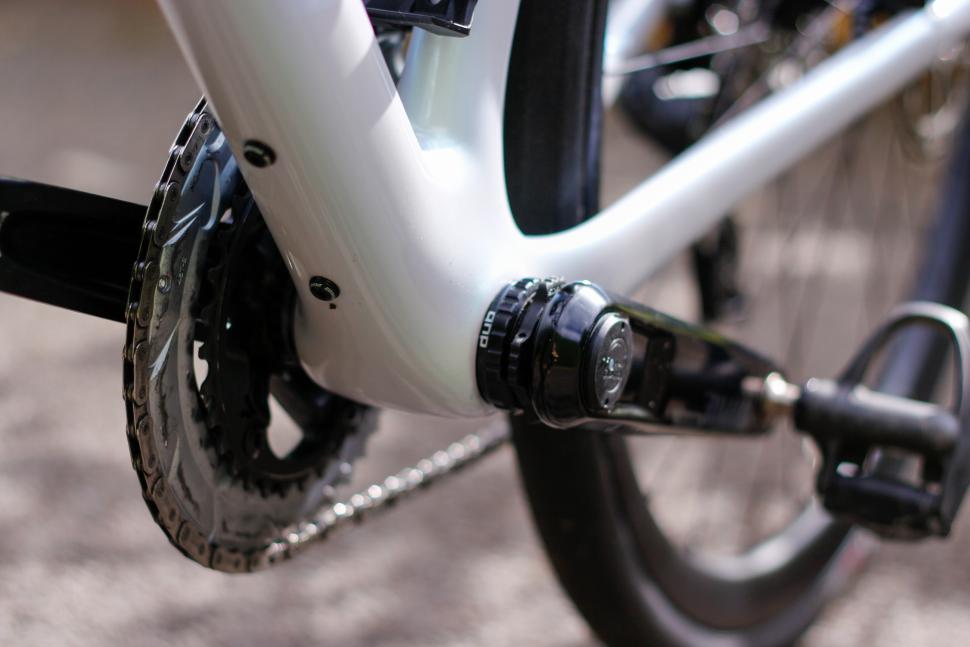
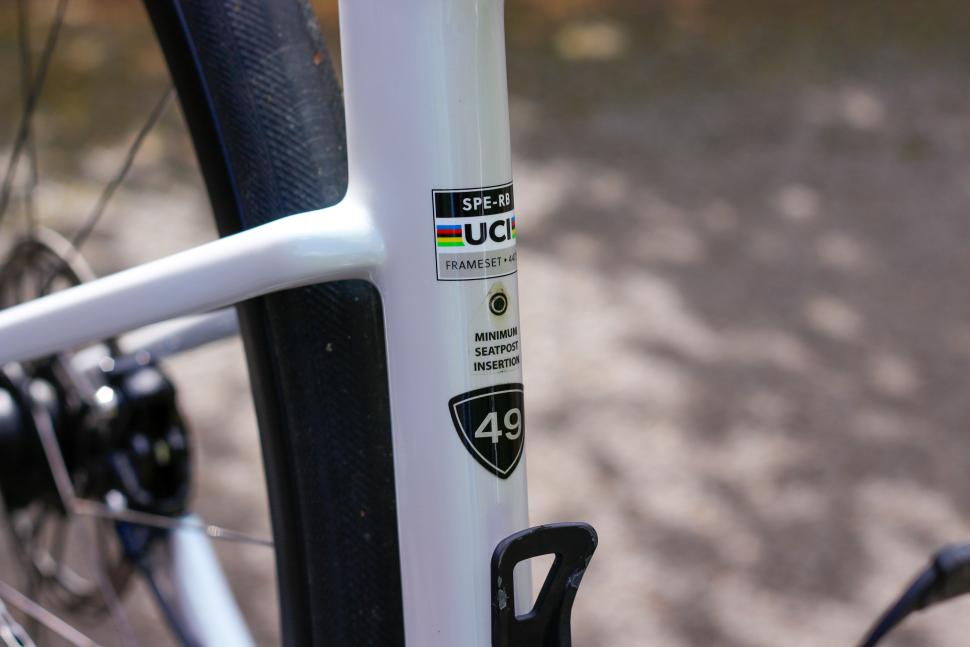
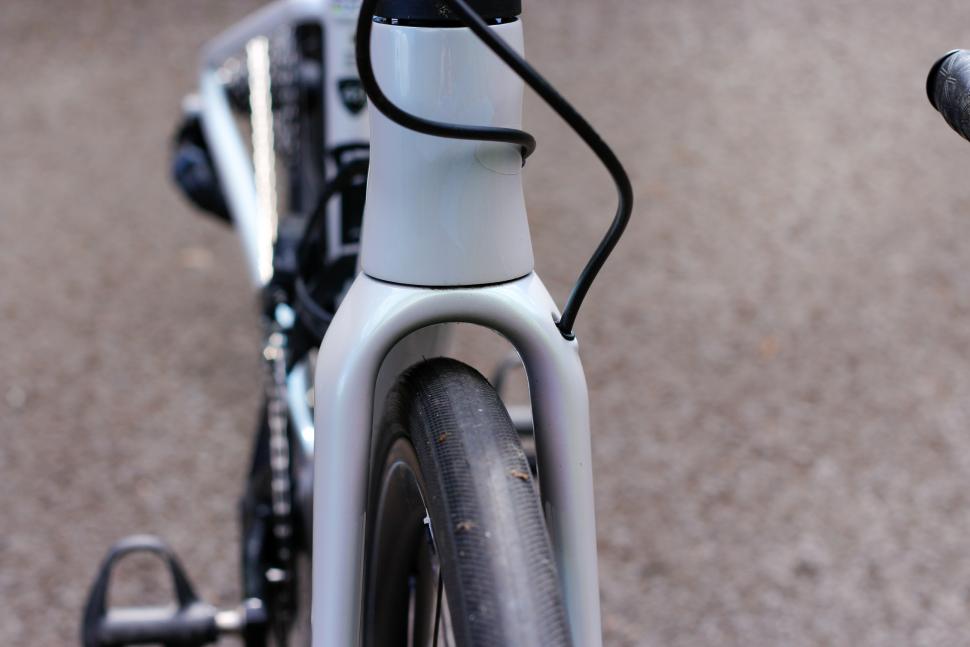
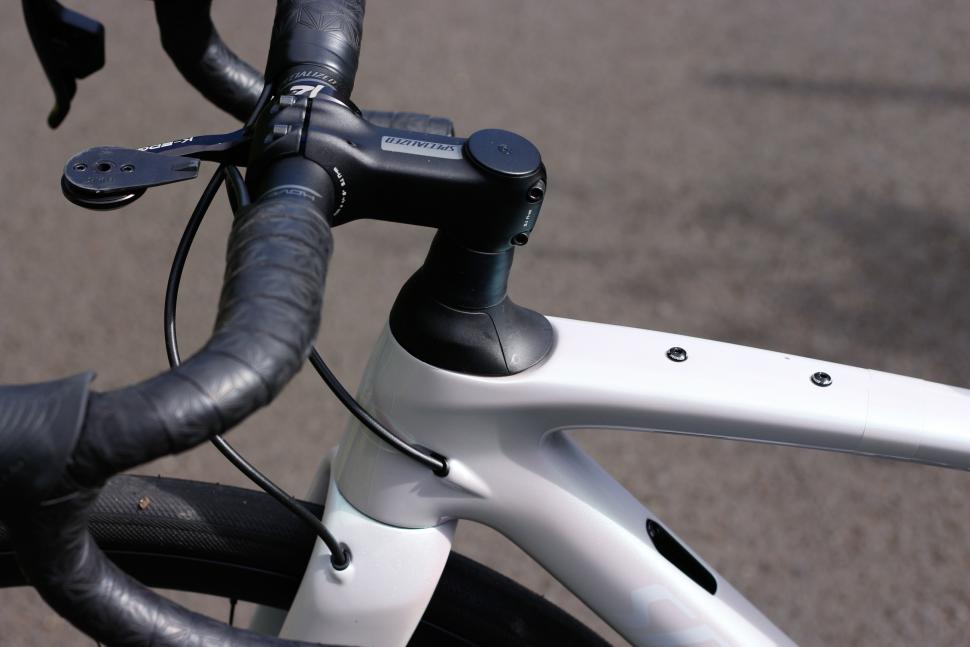
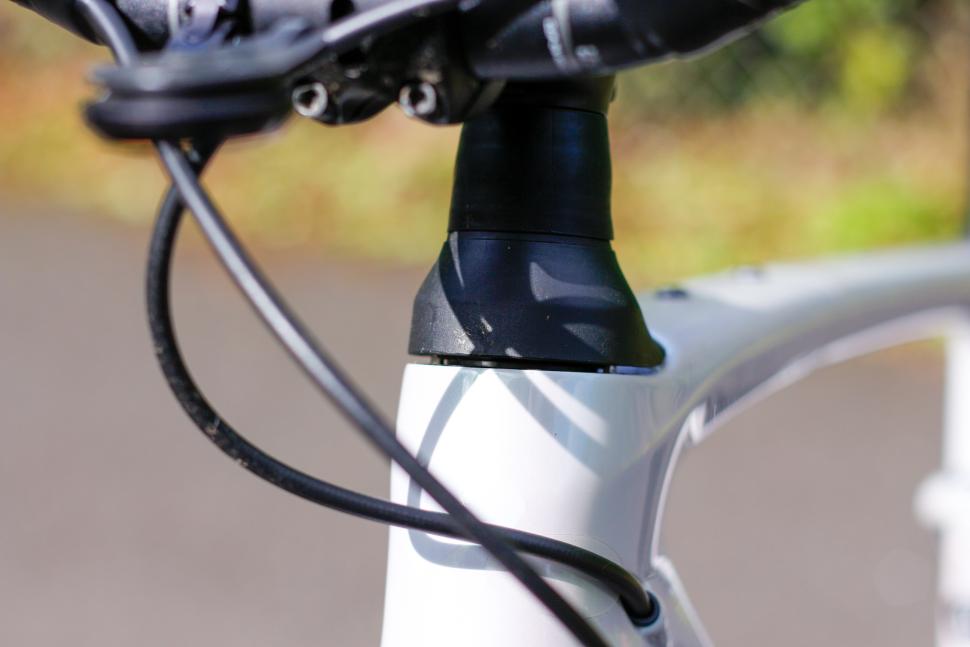


























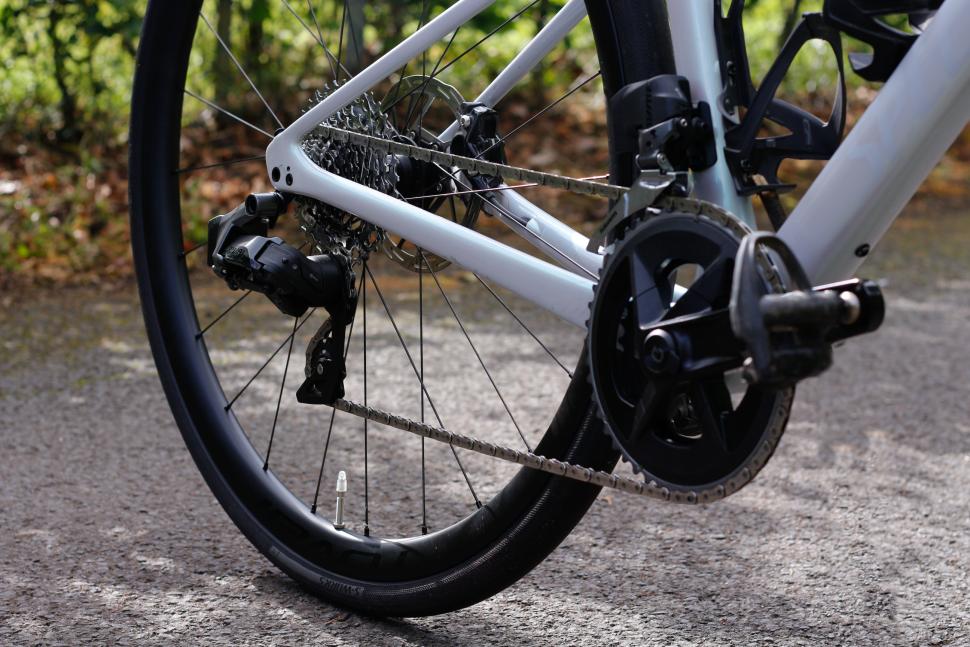
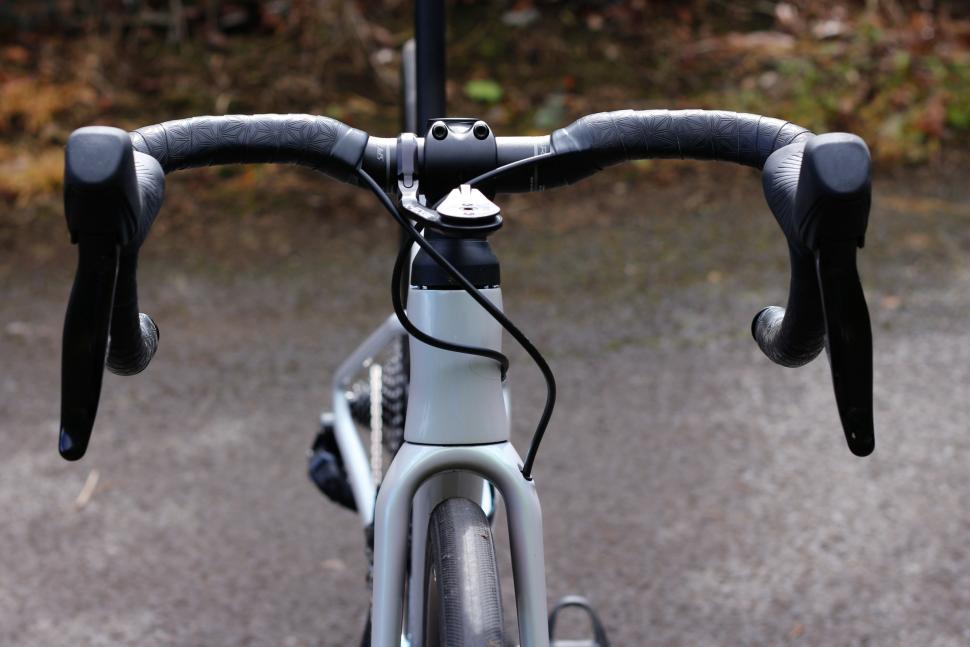
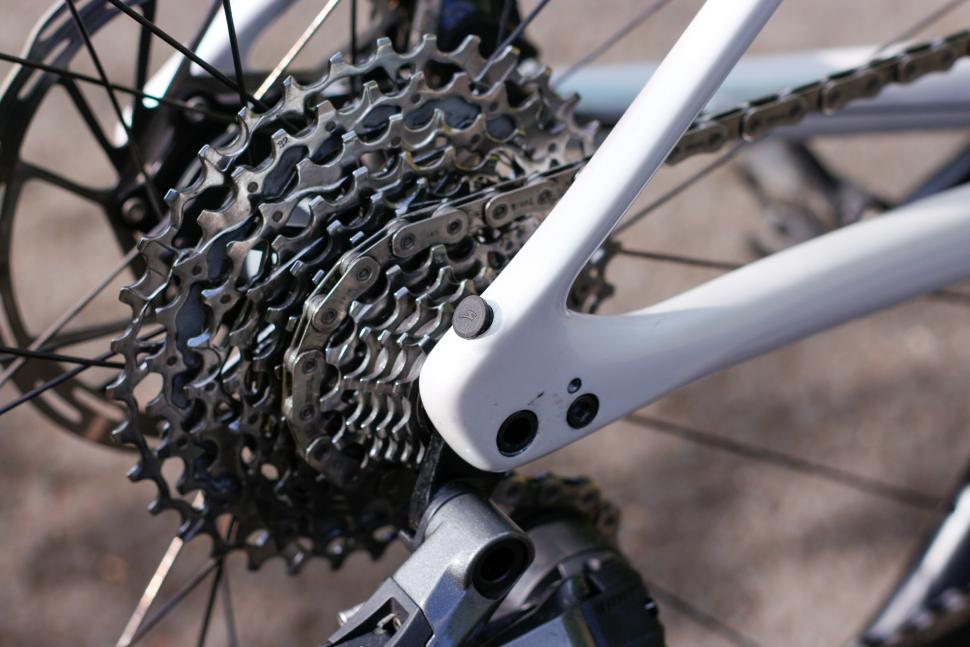
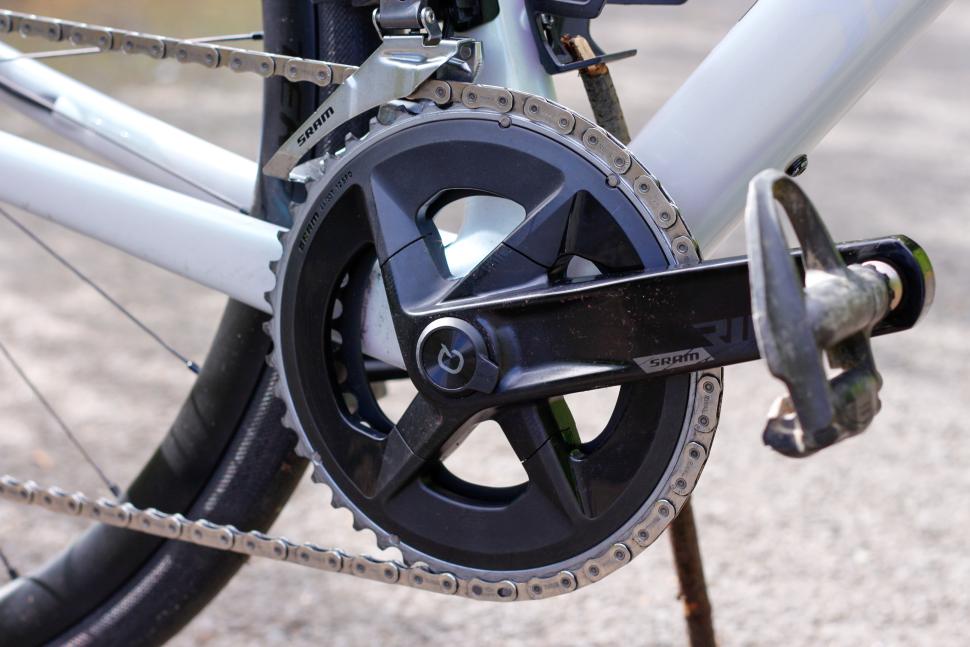
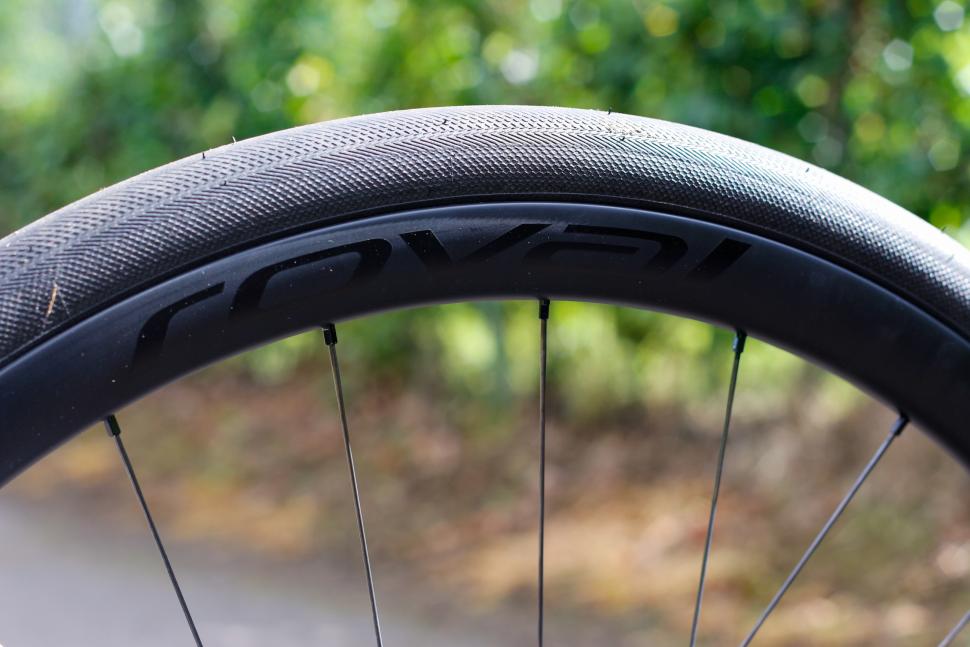
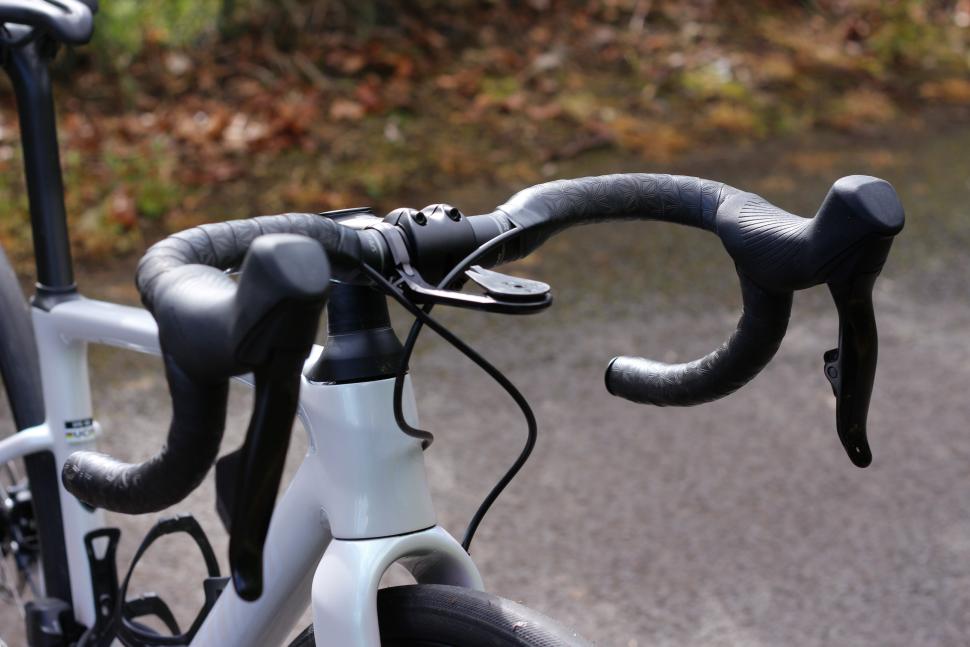
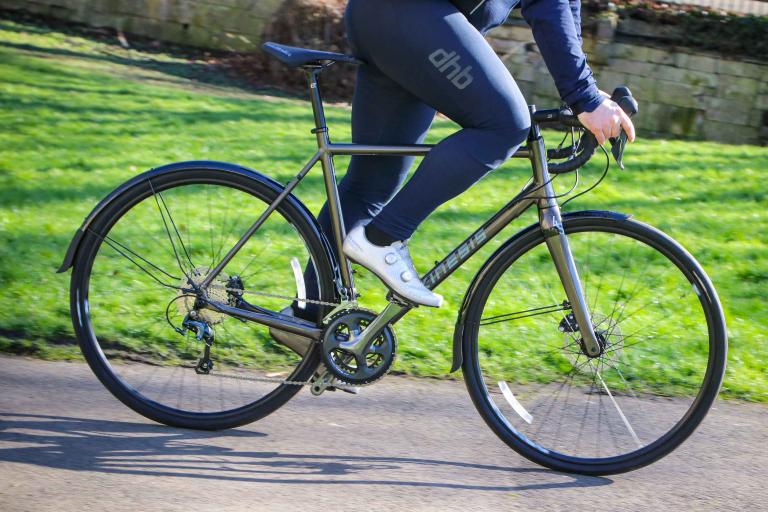
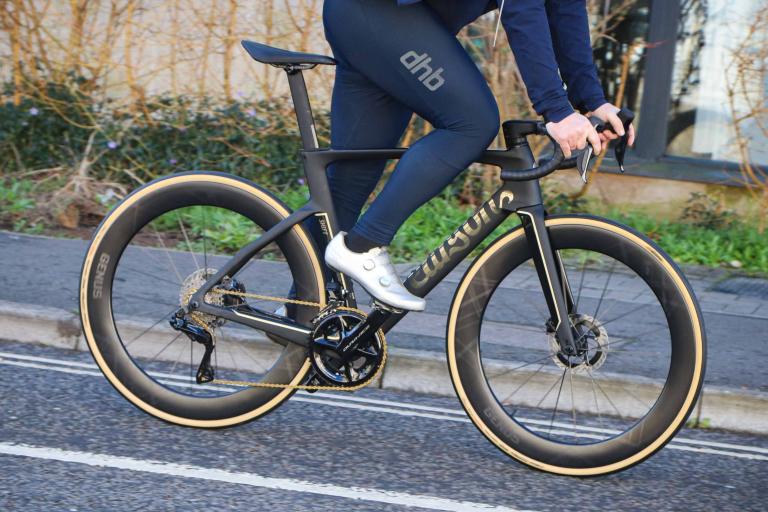
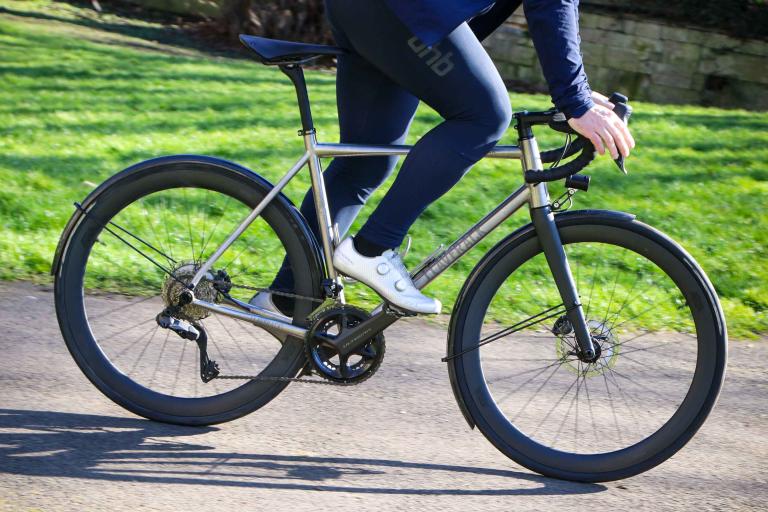
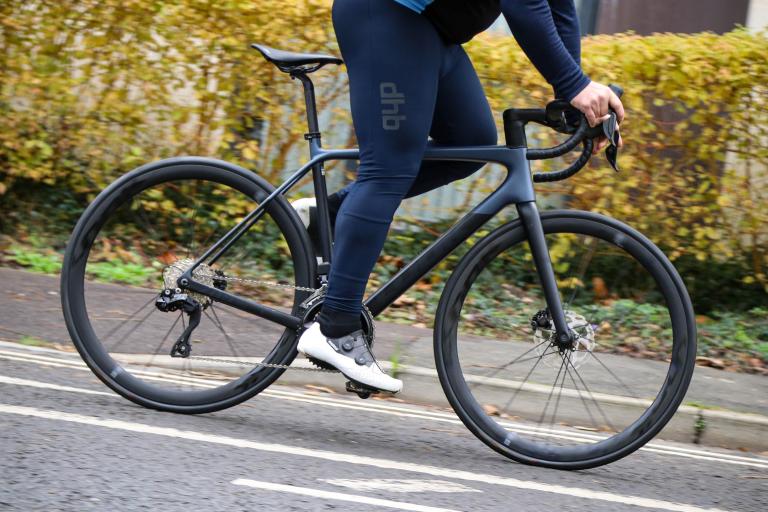
Add new comment
6 comments
I have serviced a few of these recently, brill frame let down by the headset system which hasnt been improved since it came in about 7yrs ago. And you make a good point about the weird riser bars. Good review 👍
I don't think I'd feel very comfortable with my bars up there. An upright position is great on an omafiets, if you want to have a good look around and be able to turn pretty much on the spot at low speeds, but for riding a bit harder I prefer to have more weight on the front wheel.
£5.5k for Rival? That's very overpriced. Not sure why you're suggesting it isn't. And 8.5kg for a size 49 is heavy (although those wheels are a little on the porky side) - that's got to translate to around 9kg for an 'average' size 56.
If you think that there is 500g difference between frame sizes when the entire frame likely weighs no more than 1kg then you really haven't a clue.
Specialized are not a cheap brand. If you want a Roubaix without spending £5k then the Tiagra model is £2,500. Pathetic snobs may deride the 10-speed cassette and cable shifting but it is less than half the price and a very fine bike for the money.
And if that's still too expensive then there are any number of metal framed bikes for even less money that can do the job too. If weight is a problem then eat less junk food.
Depends on the rest of the package though. You can buy Rival AXS equipped bikes at a wide range of price points above and below the price of this Spesh, e.g :
Trek Domane SLR 6 Rival - £7,400
Trek Domane SL 6 Rival - £4,625
Canyon Endurace CF 7 AXS Rival - £2,999
The review does say you can get better groupsets for less money - seems fair.
Giant Defy Advanced 0 - £3,299
Giant don't offer a Revolt Advanced with Rival but there are several options from £1,919 to £2,959 (reduced prices)
Cannondale Topstone Carbon - £4,850